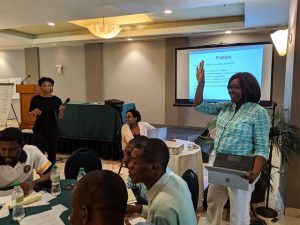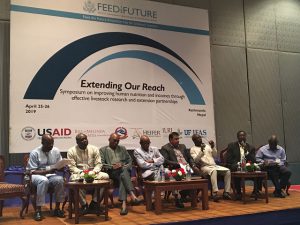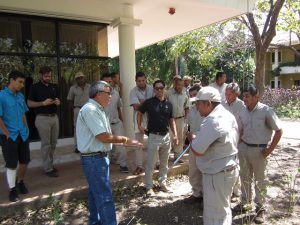UF/IFAS Extension is a grassroots organization, designed to benefit Floridians. However, to be effective locally, we have set our sights globally. Why is that?
Think of it in terms of the butterfly effect. You’ve probably heard of the phenomenon, first expressed by meteorologist Edward Lorenz, where a single butterfly moving its wings can set off a ripple effect that ultimately leads to a thunderstorm in another part of the world. In other words, small actions locally can result in large effects elsewhere. A new plant variety developed in Immokalee can lead to food security and economic stability in Haiti. A farmer in Brazil can have an insight that saves citrus groves in Florida.
The world is becoming increasingly interdependent—ecologically, economically and culturally—and globalization affects even the most remote communities. Stronger agriculture in one part of the world creates better market opportunities for growers in Florida. Managing pest outbreaks overseas can prevent those same pests from reaching our shores. In order to serve clients in our own neighborhood we need to be more responsive to how our policies affect people in other countries, and how their policies affect our local communities.
We also need to be cognizant that our local clientele are culturally diverse, and to serve diverse audiences we need to gain a more global perspective and develop cross-cultural competency skills. Experience working in a country where English isn’t the dominant language can be a crash-course for communicating across cultures in our own communities.
Furthermore, many developing countries do not have the same system of land-grant universities and cooperative Extension services that we have in the United States. UF/IFAS Extension is in a unique position to provide leadership in bringing research discoveries and science-based education to parts of the world that are in dire need of improved nutrition, sustainable agriculture, and food security.
UF/IFAS has a long history of supporting research, teaching and Extension efforts around the world, and our commitment to international cooperation has grown in recent years. Today, the UF/IFAS manages two major international projects, sponsored by the U.S. Agency for International Development (USAID): Feed the Future Haiti AREA, and the Feed the Future Innovation Lab for Livestock Systems. These programs are dedicated to working with producers, researchers and policymakers in developing countries to enhance agriculture and food systems, alleviate malnutrition and increase food security. UF/IFAS’ International Programs Advisory Team (IPAT) represents faculty issues and interests as our global footprint grows, while the International Support Team (IIST) develops our infrastructure around international activities by providing proposal, fiscal and compliance assistance and oversight.
Recent examples of sharing IFAS Extension expertise with the world:
- In mid-May, Norma Samuel, an Extension agent in Sumter County, traveled to Port-au-Prince, Haiti to lead a weeklong training course for Haitian agricultural Extension agents. Understanding the professional development needs of Extension personnel in both Central Florida and throughout the Caribbean is one of Dr. Samuel’s specialties. About 75 Extension professionals, researchers and educators participated in the workshops (nearly twice the outcome they were expecting). The course was a collaboration between Haiti’s Ministry of Agriculture and UF/IFAS’ Feed the Future Haiti AREA project. AREA (Appui à al Rechereche et au Développement Agricole) seeks to help Haiti address food insecurity and undernutrition by strengthening and supporting its agricultural institutions.

- In April, UF/IFAS staff and faculty members, including Adegbola Adesogan, Sebastian Galindo, Saquib Mukhtar, Brian Myers and myself, attended the Symposium on Global Nutrition in Kathmandu, Nepal. Ministers, policymakers, researchers and Extension faculty from 10 nations met to develop strategies to address global malnutrition and food insecurity by increasing the production and consumption of nutritious animal-source foods (ASF). The symposium was part of an annual series conducted by UF/IFAS’ Feed the Future Innovation Lab for Livestock Systems.

Panel session at the 2019 Symposium on Global Nutrition in Kathmandu, Nepal. - Earlier this year, a team of seven Extension faculty (Andrea Alberin, Alex Bolques, Adrian Hunsberger, Daniel Leonard, Henry Mayer, Julie McConnell and Bryan Unruh) travelled to Costa Rica to deliver a four-week horticultural training program for landscape professionals. Master of Gardens is a program conducted in partnership with EARTH University of Costa Rica and Reserva Conchal, and it was developed to share Extension’s experience with innovative horticulture practices to maintain the delicate balance between Costa Rica’s local ecology and tourism interests.

Alex Bolques conducts a class on soil sampling for landscape professionals in Costa Rica. - Christine Kelly-Begazo, Extension director for Indian River County, has been returning each summer to Honduras to teach Spanish-speaking producers, farm workers, interns and youth about sustainable agriculture and food safety. In 2018, she received the International Extension Award from IFAS Global for her work.
- Stephen Futch, multicounty Extension agent in the Southwest District, is currently in Sao Paulo, Brazil, as part of a long-term study of Brazil’s citrus production and how growers manage citrus greening.
- The 4-H International Exchange Program has been active since 2015. In partnership with the States’ 4-H International, the program has so far hosted 63 youth from Japan and South Korea during summer. Last year, the program expanded to include exchange students for the full academic year and is looking forward to welcoming a new group of exchange students beginning in July and continuing through June 2020.
These are just a few of the recent projects where UF/IFAS Extension is providing leadership around the globe, exchanging ideas and learning lessons that can help us serve our communities here in Florida. We’re committed to internationalizing Extension to improve the quality of life for people in Florida and all around the world. To learn more about developing international programs for UF/IFAS Extension, contact the IFAS International Support Team at https://research.ifas.ufl.edu/iist/.
 0
0


